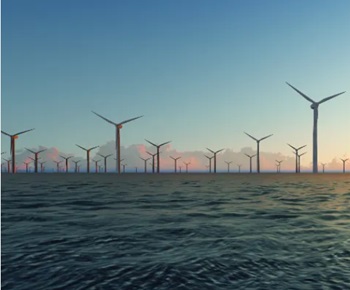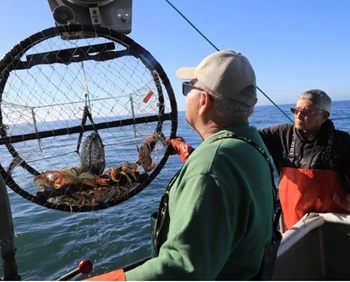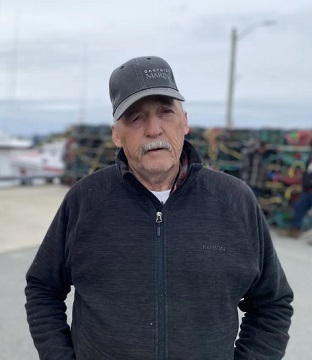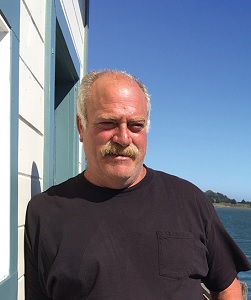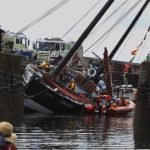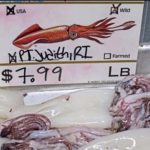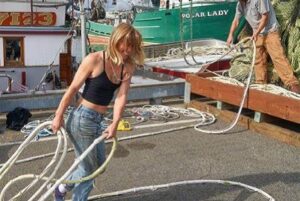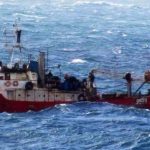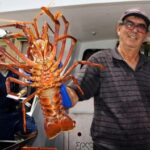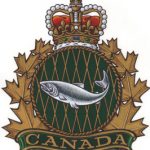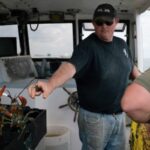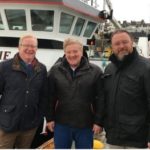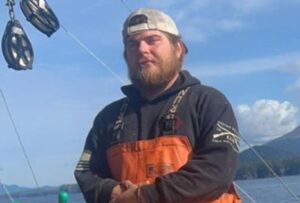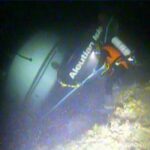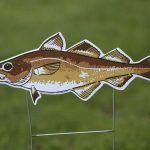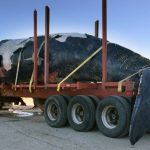Tag Archives: Whales
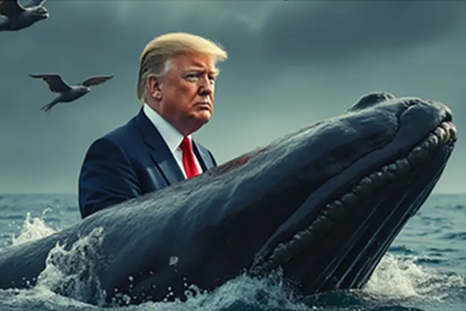
New Report Suggests “Whale Psychiatrist” Trump May be Right About Wind Farms and Whales
US Bureau of Ocean Management report says whales, dolphins, birds and bats can all be injured by wind turbine construction, and offshore fishing harmed. Trump has been an advocate for keeping America clean and healthy. He has not advocated for the anti-carbon push based on pseudoscience and the rush into green energy projects put forth by environmentalists. Admittedly. the National Oceanic and Atmospheric Administration (NOAA) has officials saying they have found no evidence linking offshore wind turbines to whale deaths. However, a new report from the U.S. Bureau of Ocean Energy Management (BOEM) has just released a new report that said whales, dolphins, birds and more can be exposed to “unavoidable adverse impacts” by the construction of offshore wind farms. more, >>CLICK TO READ<< 08:50
New Federal Report: Offshore Wind Farm Construction Can Harm Whales, Birds, Fisheries – >>CLICK TO READ<<
WHALES DECLARE BOEM IS A TERRORIST ORGANIZATION COMMITTING GENOCIDE By Jim Lovgren
 In a press release issued today by the AAA, an aquatic coalition of many different marine creatures, it was declared that the United States Bureau of Ocean Energy Management was a terrorist organization intent on the extermination of all marine mammals and other sea life. The National Marine Fishery Service was named as a co-conspirator, for standing by and watching, instead of doing their legally required job of protecting endangered species. The AAA, Aquatic Animals Association, is a newly formed coalition of different marine species including Whales, Dolphins, Turtles, fish, clams, and scallops. Despite the vast disparity in their abilities to communicate with each other, they have combined each other’s unique communication forms into one voice in hopes of saving themselves from extinction. From Harvey Haddock, President, Aquatic Animal Association. more, >>CLICK TO READ<< 17:14
In a press release issued today by the AAA, an aquatic coalition of many different marine creatures, it was declared that the United States Bureau of Ocean Energy Management was a terrorist organization intent on the extermination of all marine mammals and other sea life. The National Marine Fishery Service was named as a co-conspirator, for standing by and watching, instead of doing their legally required job of protecting endangered species. The AAA, Aquatic Animals Association, is a newly formed coalition of different marine species including Whales, Dolphins, Turtles, fish, clams, and scallops. Despite the vast disparity in their abilities to communicate with each other, they have combined each other’s unique communication forms into one voice in hopes of saving themselves from extinction. From Harvey Haddock, President, Aquatic Animal Association. more, >>CLICK TO READ<< 17:14
New NOAA opinion: Wind farm pile driving causing “temporary disturbance” causing “temporary disturbance”
 The federal government has issued a new “biological opinion” on Vineyard Wind’s offshore energy project 14 miles southwest of Nantucket, finding that pile-driving noise associated its construction is likely to adversely affect, but not likely jeopardize, the continued existence of whales, fish and sea turtles listed under the Endangered Species Act. “It will have no effect on any designated critical habitat,” National Oceanic and Atmospheric Administration Fisheries said in a statement. “NOAA Fisheries does not anticipate serious injuries to or mortalities of any Endangered Species Act listed whale including the North Atlantic right whale.” more, >>CLICK TO READ<< 09:01
The federal government has issued a new “biological opinion” on Vineyard Wind’s offshore energy project 14 miles southwest of Nantucket, finding that pile-driving noise associated its construction is likely to adversely affect, but not likely jeopardize, the continued existence of whales, fish and sea turtles listed under the Endangered Species Act. “It will have no effect on any designated critical habitat,” National Oceanic and Atmospheric Administration Fisheries said in a statement. “NOAA Fisheries does not anticipate serious injuries to or mortalities of any Endangered Species Act listed whale including the North Atlantic right whale.” more, >>CLICK TO READ<< 09:01
Newly released data reveals record number of cetacean deaths in UK waters
 Tragically, more than 1000 whales, dolphins and porpoises were stranded around the UK in 2018 – and it was a similar number the following year with 980 cetaceans reported to the Cetacean Strandings Investigation Programme (CSIP) in 2019. What is causing the huge upturn in cetacean deaths around the UK? There could be a number of factors of course, there are many theories out there, but at least in the case of the Sperm whales in Yorkshire, we can largely rule out ship strike and entanglement, often casually blamed for the deaths of marine mammals. Whatever your hypothesis, whether you choose to blame climate change, naval sonar, fishing, pollution or plastics, don’t ignore the elephant in the room – industrial offshore wind farms. more, >>CLICK TO READ<< 07:37
Tragically, more than 1000 whales, dolphins and porpoises were stranded around the UK in 2018 – and it was a similar number the following year with 980 cetaceans reported to the Cetacean Strandings Investigation Programme (CSIP) in 2019. What is causing the huge upturn in cetacean deaths around the UK? There could be a number of factors of course, there are many theories out there, but at least in the case of the Sperm whales in Yorkshire, we can largely rule out ship strike and entanglement, often casually blamed for the deaths of marine mammals. Whatever your hypothesis, whether you choose to blame climate change, naval sonar, fishing, pollution or plastics, don’t ignore the elephant in the room – industrial offshore wind farms. more, >>CLICK TO READ<< 07:37
Where will the whales be? Ask the climate model
In a new study, scientists say they can now use global temperature models, commonly used in climate science, to predict up to a year in advance when hot ocean temperatures will raise the risk of whale entanglements. This lead time could allow state regulators, fishers and other businesses that depend on the fishery, as well as Californians hoping for a Dungeness crab holiday meal, to plan ahead for potential fishing restrictions. Ecological forecasts could help New England and maritime Canada, where highly endangered right whales are also getting entangled in fishing gear. “My personal opinion is that this is very, very helpful,” said Richard Ogg, a commercial fishing boat captain based in Bodega Bay. more, >>click to read<< 11:57
Environmentalists face off against environmentalists over offshore wind projects
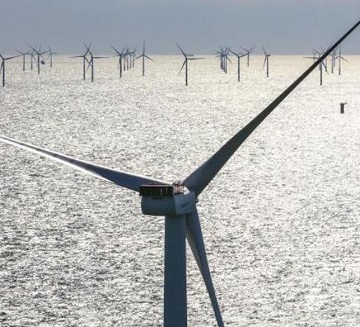 The Energy Department estimates offshore wind turbines could produce as much as 20% of regional power needs along the densely populated Eastern Seaboard from Florida to Maine by 2050. To reach that goal, the Biden administration had hoped to green-light 30 gigawatts from utility-scale offshore wind farms by 2030—enough to power nine million homes. That now seems wildly ambitious, as billions of dollars in projects have been canceled amid staggering cost overruns, soaring interest rates and supply-chain delays. Added to these economic woes are persistent environmental concerns, as attested to by some recent federal lawsuits. In September, for example, Cape May County, N.J., and a coalition of regional environmental, fisheries and tourism groups sought to stop development of two utility-scale projects off the New Jersey coast. more, >>click to read<< 11:54
The Energy Department estimates offshore wind turbines could produce as much as 20% of regional power needs along the densely populated Eastern Seaboard from Florida to Maine by 2050. To reach that goal, the Biden administration had hoped to green-light 30 gigawatts from utility-scale offshore wind farms by 2030—enough to power nine million homes. That now seems wildly ambitious, as billions of dollars in projects have been canceled amid staggering cost overruns, soaring interest rates and supply-chain delays. Added to these economic woes are persistent environmental concerns, as attested to by some recent federal lawsuits. In September, for example, Cape May County, N.J., and a coalition of regional environmental, fisheries and tourism groups sought to stop development of two utility-scale projects off the New Jersey coast. more, >>click to read<< 11:54
NFWF grants support Maine lobster industry participation in alternative fishing gear testing
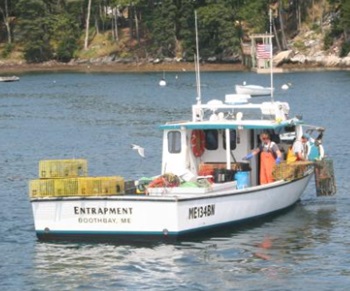 “Alternative gear, also known as “on demand” gear is a long way from being viable for fishermen or for whales,” said DMR Commissioner Patrick Keliher. “It is my goal to make sure we know what gear works, and more importantly what doesn’t work, so when future draft federal regulations come forward, we can draw on the real-world experience of fishermen when determining what the next steps should be.” One award of $1,999,992 will support the evaluation of acoustic geolocation systems that locate gear on the bottom without the benefit of surface buoys which are part of traditional gear configurations. Regional partners will include the Island Institute, Maine Center for Coastal Fisheries, Maine Coast Fishermen’s Association, the Sunrise County Economic Council, and the Gulf of Maine Lobster Foundation. more, >>click to read<< 06:09
“Alternative gear, also known as “on demand” gear is a long way from being viable for fishermen or for whales,” said DMR Commissioner Patrick Keliher. “It is my goal to make sure we know what gear works, and more importantly what doesn’t work, so when future draft federal regulations come forward, we can draw on the real-world experience of fishermen when determining what the next steps should be.” One award of $1,999,992 will support the evaluation of acoustic geolocation systems that locate gear on the bottom without the benefit of surface buoys which are part of traditional gear configurations. Regional partners will include the Island Institute, Maine Center for Coastal Fisheries, Maine Coast Fishermen’s Association, the Sunrise County Economic Council, and the Gulf of Maine Lobster Foundation. more, >>click to read<< 06:09
Commercial Dungeness crab season delayed by California Fish and Wildlife
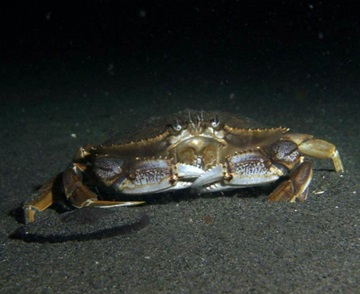 The California Department of Fish and Wildlife on Friday delayed the opening of the commercial Dungeness crab season, citing the need to protect humpback whales and other ocean life from entanglement. The delay — which will remain in effect until further notice — affects the taking and possession of commercially-caught Dungeness crab for 200 nautical miles extending from the California coastline. Additionally, a fleet advisory is in effect for recreational Dungeness crab, reminding fisheries to maintain best practices. The next risk assessment is scheduled for around Dec. 7. Friday’s decision falls on the heels of a late October call by the department to restrict recreational and commercial crab fishing in the state. >>click to read<< 09:01
The California Department of Fish and Wildlife on Friday delayed the opening of the commercial Dungeness crab season, citing the need to protect humpback whales and other ocean life from entanglement. The delay — which will remain in effect until further notice — affects the taking and possession of commercially-caught Dungeness crab for 200 nautical miles extending from the California coastline. Additionally, a fleet advisory is in effect for recreational Dungeness crab, reminding fisheries to maintain best practices. The next risk assessment is scheduled for around Dec. 7. Friday’s decision falls on the heels of a late October call by the department to restrict recreational and commercial crab fishing in the state. >>click to read<< 09:01
Offshore wind farms pose wildlife threat
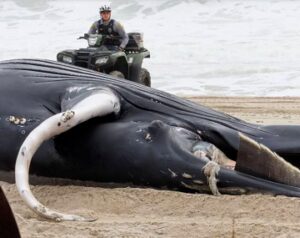 What with all the hype and grand economic plans for wind farming off Maryland’s coast, not one word from the project-movers on consequent harm to the sea’s wildlife, most notably the whales and fish. We are with Ocean City’s mayor and city council in linking the dead whales washed up on the coast with offshore wind harvesting. OC also doesn’t like the prospects for the “viewshed” — turbines visible in the distance. And has anyone considered the possible shift in the path of sharks? Do Maryland vacationers really want the ocean along our shores featuring lots of shark fins? Listen to the audio, or >click to read< By Bruce and Leslea Knauff 15:48
What with all the hype and grand economic plans for wind farming off Maryland’s coast, not one word from the project-movers on consequent harm to the sea’s wildlife, most notably the whales and fish. We are with Ocean City’s mayor and city council in linking the dead whales washed up on the coast with offshore wind harvesting. OC also doesn’t like the prospects for the “viewshed” — turbines visible in the distance. And has anyone considered the possible shift in the path of sharks? Do Maryland vacationers really want the ocean along our shores featuring lots of shark fins? Listen to the audio, or >click to read< By Bruce and Leslea Knauff 15:48

Feds play shell game with wind / whale impacts
NOAA is taking public comments on a massive proposal to harass large numbers of whales and other marine mammals by building a huge offshore wind complex. There is supposed to be an Environmental Impact Statement (EIS) for the proposed harassment, but it is not there with the proposal. We are told it is elsewhere but after searching we find that it simply does not exist. Like a shell game where the pea has been palmed, there is nothing to be found. First the bureaucratic background. The wind project is Dominion’s 2,600 MW offshore Virginia facility, which if built would be the world’s biggest. NOAA’s National Marine Fisheries Service (NMFS) is proposing to issue a five year harassment authorization for the construction of this monster. >click to read< 07:36
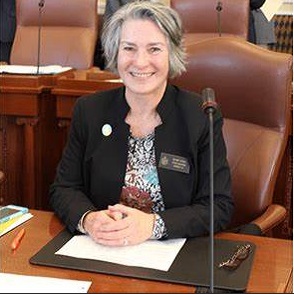
Maine may pay lobster fishers to test new gear as whale protection rules loom
Lawmakers in Maine are getting behind a drive to pay lobster fishers to comply with potential new fishing regulations. Lobster and crab fishermen face the prospect of tough new rules designed to protect vanishing North Atlantic right whales. The rules would require harvesters to use new kinds of gear and change when and where they can fish. Democratic Sen. Eloise Vitelli of Arrowsic proposed a bill that would create a “lobster innovation fund” to pay lobster fishing license holders to test new fishing technologies. >click to read< 13:18
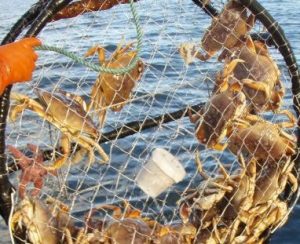
For Whales and Crabbers, Finding Balance Is Getting Harder
In Dick Ogg’s 25 years of commercial fishing, he’s had a few close encounters with whales—mostly while pulling Dungeness crab pots off the ocean floor. “I’ve had whales right next to me,” within about five meters, says Ogg. “They follow me, they watch, they’re curious. And then they go on about their business.” Ogg is fortunate his interactions have been so leisurely. For nearly a decade, California’s whales and crabbers have been locked in a persistent struggle. From 1985 to 2014, the National Oceanic and Atmospheric Administration (NOAA) reported an average of 10 whales were entangled in fishing gear each year along the west coast of the United States. >click to read< 07:53
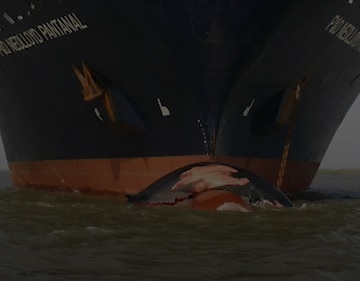
Ship strikes may be the difference between extinction and survival for whales
Ship strikes pose a serious threat to whales and have the potential to cause highly endangered subspecies to go extinct. The remaining 1.3 million whales left in our oceans are facing an increasing amount of shipping traffic when coming to the surface and travelling to their feeding or breeding areas. Global maritime traffic increased fourfold between 1992 and 2012. In some corners of the world, such as the Arctic, it actually doubled between 2013 and 2018. The number of whales, in the meantime, is on the decline. >click to read< 07:43
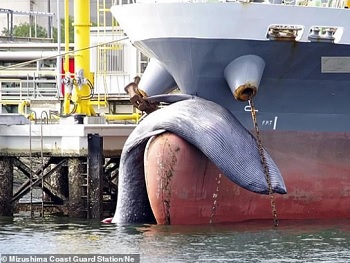
Tanker/Whale Strike Update: ENGO says number of whales killed by ships each year in the 1000s
We posted a story about a 32-foot whale carcass was found wedged on the bow of a Japanese tanker as it pulled into harbour. Shocking images, wasn’t much there. The article today has information that is useful to commercial fishermen trying to survive the ridiculous, engo inspired rules regarding fishery restrictions, and rule changes. Ship strikes are known to be one of the leading causes of death for endangered and vulnerable whale populations, according to WWF. Michael Fishbach, executive director and co-founder of the Great Whale Conservancy, an environmental NGO based in North Carolina, told Insider that a dozen whales are killed by a ship for each one that is recorded. >click to read< 10:46
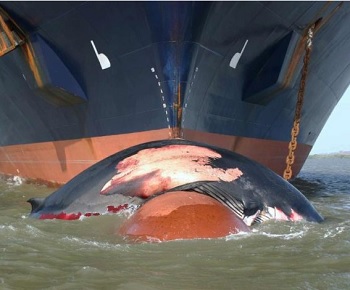
While cargo shipments boom, ship strikes imperil whales in California and worldwide
Earlier this year, horrific photos of two fin whales pinned to the hull of an Australian naval ship gained worldwide attention. The vessel had been conducting exercises in the waters near San Diego. The two bodies, one 65 feet long, the other just 25 feet, were draped over the hull. “Anywhere you have major shipping routes and whales in the same place, you are going to see collisions,” said Russell Leaper, an expert with the International Whaling Commission. “Unfortunately, that’s the situation in many places.” While gray whales and humpbacks make up 70% of the reported strikes in the government’s database, it’s the endangered and threatened populations such as North Atlantic right whales and the gargantuan Pacific blues that concern scientists the most. For those whales, each death comes with a risk of population or species extinction. >click to read< 12:06

Whales, Warming and Offshore Wind Farms – Lobstering is under attack
As Rep. Billy Bob Faulkingham described it, three seemingly combined forces are aligned and have put the bull’s-eye on the men and women in Maine whose lives depend on lobstering, whales, warming and wind power. The right whale protection consortium has heightened its efforts to alter nearly every aspect of Maine’s primary fishing industry by pushing the federal fisheries agencies to limit, reduce and even eliminate the fishing methods currently employed in the local waters and the Gulf of Maine,,, At best, the supposed science is leaning toward saving whales, with little regard for the men and women who are active conservationists every day while doing their jobs. The warming water folks, often the same groups and agencies that are involved with the right whale restrictions, also want to promote bureaucratic rules that will severely impact all forms of fishing. >click to read< 11:06

Ship strikes: Saving the Whales is Something the Shipping Industry Needs to Address Immediately
It is a little known fact that up to 20,000 whales die each year because of lethal collisions with vessels. When presented with the sight of one of the great mammals lying dead on the bows of a container ship as shown above the message comes home, but for most of the stricken animals they are fated to die unseen beneath the waves.,, Whale ship strikes have now become a significant threat to big cetaceans. Collisions kill 20 times more whales than the controversial practice of whale hunting or whaling. >click to read< 08:50
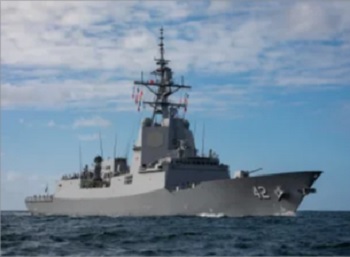
Two dead whales found lodged under hull of Australian warship docked in San Diego
The whales were discovered as the ship, HMAS Sydney, berthed at Naval Base San Diego, the Australian Royal Navy said in a statement. Experts say the physics of the situation are somewhat common, even if the presence of more than one whale makes this scenario rare.,, John Calambokidis, a leading expert on West Coast ship strikes, said the incident highlights what he’s concluded in his research: ship strikes are dramatically underreported. “We think it’s somewhere in the neighborhood of 5 or less of the number of ship strikes occurring are getting documented,” >click to read< 08:55
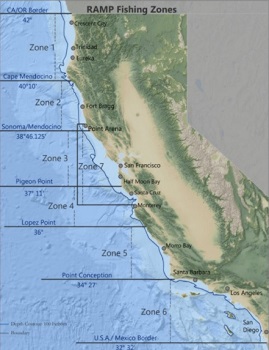
California Commercial Dungeness Crab Update
The California Department of Fish and Wildlife (CDFW) just completed the most recent marine life entanglement risk assessment under the Risk Assessment Mitigation Program (RAMP). Recent survey data indicate most Humpback and Blue whales remain outside of the California fishing grounds, however a few Humpback whales have begun to return to Monterey Bay and the Gulf of the Farallones. As a result, the Director of CDFW has issued a statewide Fleet Advisory for the commercial Dungeness crab fishery for all Fishing Zones (Oregon state line to Mexico). >click to read< 08:22
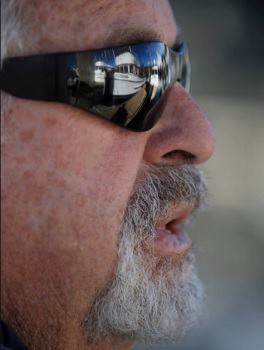
California: Don’t expect Dungeness Crab for Christmas this year
“Unless a miracle happens, which is highly unlikely, we won’t see crab for Christmas,” said Tony Anello, a veteran fisher who runs his boat, the Annabelle, out of Bodega Bay and offers up his tender product at Spud Point Crab Co. After several years of varied setbacks and more than a month of delays to the 2020 Dungeness season, local crabbers now face a new hurdle as they haggle over price with large wholesalers. “We should be traveling right now,” Dick Ogg,,, wholesalers are asking skippers to cut their prices by 30% to 35%, leaving both sides approximately $1 a pound apart from an agreement that would start the crab season. >click to read< 08:05
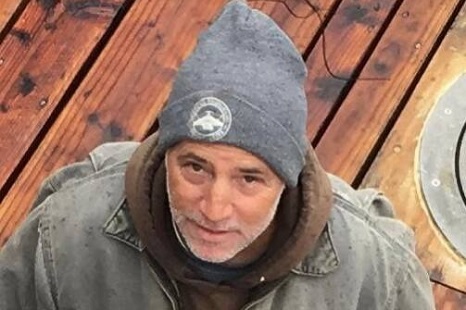
Ben Platt: Whales aren’t at risk from crab fishing along California’s coast
Anyone who lives in or near California’s many historic fishing communities like Morro Bay, Monterey, or Half Moon Bay, has probably heard the term “ropeless” crab fishing gear. That’s the new buzzword for equipment being promoted by environmental groups to solve the perceived problem of whale interactions with fishing gear.,,, Both the East Coast Lobster fishery and the West Coast Dungeness crab fishery, each of which are made up of thousands of independent fishermen, have tested the pop-up “ropeless” gear and found it to be faulty. Meanwhile, strikes by large ships likely cause 50-150 whale deaths a year off the West Coast,,, >click to read< 07:31
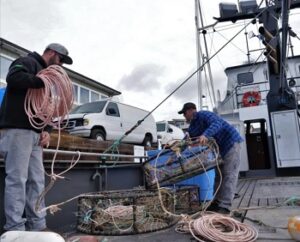
Monterey Bay Fishermen hit with new wave of Dungeness crab season delays
You couldn’t blame crab fishermen Tim and Dan Obert for feeling like they’re passing through the perfect storm. First there was the pandemic, which shut down restaurants and, in turn, much of the demand for Dungeness crab. Then a new regulation took effect on Nov. 1 that heavily restricts the Dungeness fishery’s operations when whales and sea turtles are around. Then the state delayed the opening of the Dungeness crab season until after Thanksgiving. “If you take all three of those things, you will destroy this fishery,” said Tim Obert, 35, of Scotts Valley. “There will be no crabbers left.” >click to read< 08:47

CDFW: Commercial crab season will be delayed due to the presence of whales
The commercial Dungeness crab season in the central management area, which was scheduled to open Sunday, Nov. 15, will be delayed due to the presence of whales within fishing grounds and the potential for entanglement.,, “While no one wants to delay the season, CDFW and the Working Group feel a delay is necessary to reduce the risk of entanglement,” said CDFW Director Charlton H. Bonham. “The fleet has gone to great lengths to be more nimble in order to protect whales and turtles, and the results are promising. This year for the first time in a long time it looks like we don’t have to worry about domoic acid, which is good news.” >click to read< 15:05
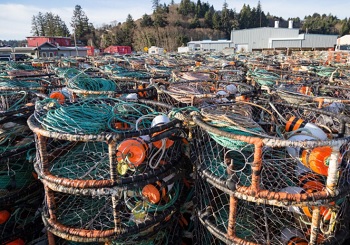
Crab industry, Oregon continue plans to avoid whale entanglement
New regulations for commercial Dungeness crab fishermen in Oregon aim to get boats on the water earlier in the season and reduce the amount of gear to avoid tangling with endangered whales. “Our fleet is made up of 400 individual businesspeople who each bring a different perspective to the issue,” said Hugh Link, the executive director of the Oregon Dungeness Crab Commission. “For over three years, they have been given the opportunity to weigh in on how best to mitigate the whale entanglement risk,” he continued. “But it is an ongoing process. These upcoming meetings are the next important step and we hope they take the opportunity to have their voices heard.”
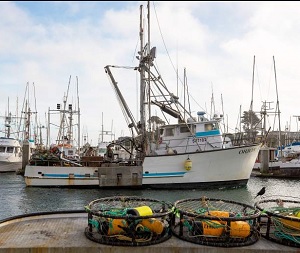
New rules for California Dungeness crab fleet
The California Department of Fish and Wildlife on Friday unveiled a batch of complex new rules designed to reduce the risk to endangered whales and sea turtles of becoming entangled in commercial Dungeness crab fishing gear. The draft regulations are set to be finalized before the next commercial season starts in November after a period of public review. Among the provisions are options to restrict fishing in certain depths, require crabbers to set only a share of the traps for which they’re permitted or limit intervention to any of six newly established geographic zones, rather than the larger Northern and Central California management districts that currently exist. >click to read< 09:14
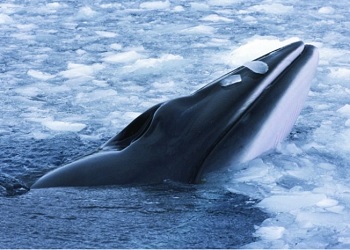
Supply and Demand – Fishermen In Iceland Will Not Hunt Whales For The First Time In 17 Years
Fishermen from Iceland will not hunt whales this summer, this will the first year in 17 years that the fishermen will abandon the whale hunting season. Owners of fishery companies explained why they will be skipping this season, they said that the low demand for whale meat in countries like Japan has forced them to abandon the whale hunting season this year. Loftsson explained their decision, he said that this was all because of the low demand in the Japanese Market. But according to a captain, the real reason why fishermen were skipping this year’s hunting season is that the permit was not handed out in time. >click to read< 14:03
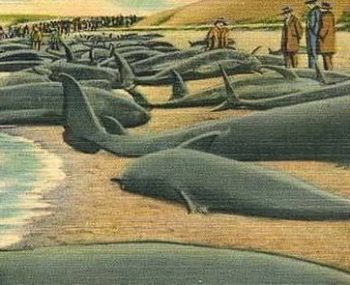
On This Day in 1958: Fifty whales stranded on Cape Cod
The United Press International wire story began; Tides Strand 50 Whales Off Cape Cod Island WELLFLEET, Mass., July 5 (UPI) — Tides of the Atlantic Ocean that refloated some 100 small whales brought more than half of them back again today… Townsfolk, aware of the problem of removing dead (and very smelly) whales from the sand bars, were joyful when an early morning tide washed most of the mammals free. But the joy was short-lived. The afternoon tide brought about sixty of the whales back onto the shore. >click to read< 08:06






